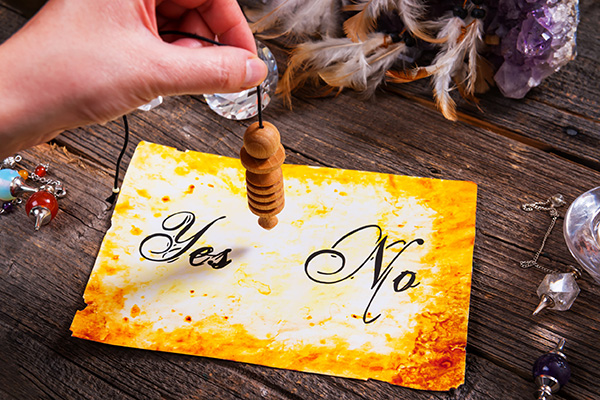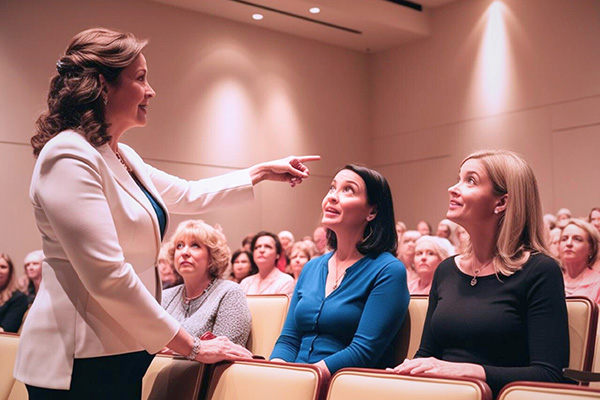How to Utilize a Pendulum for Spiritual Direction
 The pendulum is an uncomplicated yet effective psychic instrument that can significantly boost spiritual growth and intuitive development — when utilized with genuine intent and attuned to the highest good of everyone involved.
The pendulum is an uncomplicated yet effective psychic instrument that can significantly boost spiritual growth and intuitive development — when utilized with genuine intent and attuned to the highest good of everyone involved.
From my perspective, anyone can engage in dowsing with a pendulum. It doesn’t necessitate special skills or training — merely an openness to trust and practice. As with any spiritual practice or metaphysical instrument, the essential element is consistent practice, coupled with a sincere desire to achieve proficiency.
Initially, it’s crucial to grant yourself the grace to err. That’s a fundamental part of the learning process.
The journey of discovering how the pendulum works optimally for you is highly individual. There’s no strict protocol to adhere to. While certain books may propose a certain method it’s “meant to function,” I urge you to release rigid rules and expectations, allowing the pendulum’s energy to manifest in a way that naturally resonates with your own vibration. This will invariably be the most precise and effective approach for you.
As time progresses and you consistently engage with your pendulum, the outcomes become more dependable, steady, and lucid. You start to develop a heightened sensitivity — not only to the pendulum’s movements but also to the energy propelling it.
Through continual exploration and commitment, you begin to harmonize more profoundly with your higher self, subconscious mind, and spirit guides. The pendulum evolves into a mirror and a conduit — reflecting your inner landscape and connecting you with dimensions beyond ordinary perception.
A vital point to remember is to set your ego aside. Pendulum work isn’t about controlling the result. It’s about becoming a vessel — permitting the energy to flow through you and communicate in its distinct manner.
Among the various oracles available, pendulums may be the most user-friendly, particularly for obtaining swift and spontaneous answers. You can conveniently carry one with you and easily pull it out for quick yes or no responses ~ Radleigh Valentine
Approach your pendulum with humility, reverence, and clarity. Always set the intention that the information you obtain serves the highest good, both for yourself and for those to whom you are reading. You may not always receive the answer you desire, but if you align with truth and service, you will obtain the response that is most fitting.
A Transformative Personal Encounter
One of my most transformative experiences with the pendulum transpired when I was first beginning to explore pendulum dowsing. It occurred one serene evening when I was home alone. The house is nearly three hundred years old, and I’m the fourth generation to inhabit it, so its walls harbor a profound family legacy.
On this specific night, I was practicing with what would soon become my favorite pendulum – a silver one featuring an elaborate Celtic design – and utilizing a new alphabet pendulum chart.
Intrigued, I inquired, “Is there a spirit with me at this moment?” The pendulum swung decisively to “yes.”
I felt a tingle, not of fear, but of exhilaration. I then asked, “Who are you?”
I allowed the pendulum to swing from letter to letter. At first, it seemed nonsensical, but a few letters in, I was astonished to realize it was spelling out my grandfather’s full name:
S-i-l-a-s-T-a-r-b-e-l-l-L-o-n-g-l-e-y.
A unique and notable name.
I had never met Grandpa Silas in my life, and the thought of him certainly hadn’t crossed my mind that evening. That moment solidified my conviction in the pendulum as a bridge to genuine spirit interaction, and I sought his counsel on some personal matters, as well as a significant decision looming ahead. It was a deeply moving and enlightening experience.
Dowsing is the execution of a human ability that allows one to acquire information in a way that transcends the capabilities of standard human physical senses such as sight, sound, and touch ~ Raymond C. Willey
Selecting & Preparing Your Pendulum
<pChoosing a pendulum to utilize is a deeply intuitive and personal journey. Let your heart lead the way. You may find yourself attracted to a specific crystal or metal, or perhaps to a symbolic design such as a Celtic knot or sacred geometrical pattern. The ideal pendulum will typically "speak" to you — it might catch your eye or feel right in your hand. When held, it ought to feel balanced, comfortable, and reactive.
If you don’t possess a commercially made pendulum, you can effortlessly create one. Simply take a piece of thread, string, or chain measuring about six to seven inches long. Attach a small, weighted object such as a ring, bead, or even a needle to one end. A traditional homemade pendulum often consists of a needle and string. Secure a bead or knot at the opposite end for grip while divining.
Before commencing a session, it’s advisable to find a tranquil, comfortable location where you won’t be interrupted. Center yourself. Take deep breaths, relax your body, and focus on the present moment. This will help align your energy and quiet your mind, allowing clearer responses to emerge.
Mastering Pendulum Reading
The initial step in using a pendulum is understanding how it conveys messages to you. Each individual has a distinct energetic reaction. Prompt your pendulum to indicate what “yes” looks like. Observe its movement — does it swing clockwise? In a straight line? Then ask it to illustrate “no.” Some individuals may also define a motion for “maybe” or “undecided.” There’s no right or wrong here; it’s about crafting a consistent energetic dialogue between you and your pendulum.
Once you’ve recognized your movement patterns, you can commence asking questions. Pendulums are most effective with inquiries that can be answered with a clear “yes,” “no,” or “maybe.” You can also incorporate pendulum charts for more detailed responses. These charts can consist of letters, numbers, months, colors, and more. Various pendulum charts are available online, or you can create your own tailored to the answers you seek.
It’s essential to bear in mind that the pendulum reflects the energy of the current moment. Responses can shift as situations evolve or new information arises. Therefore, I constantly underscore that pendulum readings represent a snapshot of the prevailing energy field — not an unyielding prediction etched in stone.
Factual information alone isn’t enough to navigate life’s intricate challenges. You require and deserve regular doses of uncanny insights. One of your inherent rights as a human being should be to receive mysteriously helpful omens every day of your existence ~ Rob Brezsny
Practical Applications for Daily Insight
The pendulum is not solely for spirit communication. I’ve utilized it for everything from selecting the most beneficial supplements for my health to making everyday choices. When approached respectfully and with reverence, the pendulum transforms into a trusted ally across all facets of life.
If you wish to delve deeply into working with the pendulum, I recommend dedicating 20 to 30 minutes daily for focused practice. This regular time fosters a connection between your energy and the pendulum. As you become more familiar with its movements and more confident in your questioning, your results will undoubtedly improve.
Over time, you’ll realize that pendulum dowsing can assist you in nurturing intuition, alleviating doubts, receiving guidance, and enriching your spiritual journey. Like all spiritual instruments, the pendulum does not bestow power — it aids you in recalling the power and wisdom that already resides within you.
Engaging with the pendulum is both an art and a science. It requires patience, trust, and an openness to work with the unseen realms. However, with consistent practice, it can evolve into one of your most cherished and dependable spiritual instruments.
Most importantly, allow your heart to lead you. Ensure your intentions are pure. Let your inquiries come from a place of humility and curiosity. And let the pendulum swing — not as a fortune-teller, but as a sacred companion in your journey of awakening.
|
Elizabeth’s abilities have been passed down through generations. She recognized her own gifts early on, distinguishing herself from most individuals around her. Since then, she’s refined and mastered various metaphysical practices, offering hypnotherapy, Psychic Mediumship, Mysticism, and Hypno-Reiki to her clients in Maine and in various locations throughout the US and Canada, where she frequently travels. A passionate animal lover, her pets serve as her greatest mentors and often contribute during readings, alongside the Angels, Guides, and loved ones who provide insights and resolutions for her clients. Elizabeth is also an author with much spiritual knowledge to share and is in the process of writing a book. If you’re interested in receiving her unique Psychic Wisdom to find peace and obtain answers that will support your highest good, you can contact Elizabeth at Psychic Access. |
Pendulums have served as a divination and spiritual guidance tool for centuries. They are thought to connect with the energy of the subconscious mind and the spiritual realm, enabling users to gain insights and direction on various aspects of their lives. If you’re keen on using a pendulum for spiritual guidance, here are some effective tips to follow.
1. Select the appropriate pendulum: Pendulums are available in various shapes, sizes, and materials. It’s vital to choose one that resonates with you and feels comfortable in your hand. Depending on your preference, opting for a pendulum made of crystal, metal, or wood is essential.
2. Cleanse and charge your pendulum: Prior to utilizing your pendulum for spiritual guidance, cleanse and charge it to eliminate any negative energy and align it with your intentions. You can accomplish this by holding it under running water, smudging it with sage or incense, or placing it in sunlight or moonlight for a few hours.
3. Define your intention: Before utilizing the pendulum, it’s crucial to establish your intention and request guidance from the spiritual realm. You can hold the pendulum in your hand and concentrate on your question or intention. Alternatively, you can recite a prayer or affirmation to invite positive energy and guidance.
4. Create a connection: To effectively use the pendulum for spiritual guidance, establish a connection with your higher self or spirit guides. You can achieve this through meditation, deep breathing, or visualizing a white light encompassing you. This will aid in clearing your mind and preparing you to receive divine guidance.
5. Pose your question: Once you’ve forged a connection, start using the pendulum to ask questions. Hold it in your dominant hand and pose a yes or no inquiry. The pendulum will begin to swing in a specific direction, indicating the answer. A back-and-forth movement might signify a yes, while a circular motion could indicate a no.
6. Interpret the movement: As you inquire, observe the pendulum’s motion. Trust your intuition and interpret the movements based on your own feelings and beliefs. Remember that the pendulum serves as a guidance tool, and responses may not always be crystal clear or unequivocal.
7. Practice and trust: Like any form of divination, using a pendulum for spiritual guidance necessitates practice and patience. Trust your intuition and the guidance you receive, continually using the pendulum to strengthen your bond with the spiritual realm.
In summary, employing a pendulum for spiritual guidance can be a powerful mechanism for uncovering insights and advice from the spiritual realm. By selecting the right pendulum, cleansing and charging it, defining your intention, establishing a connection, asking questions, interpreting movements, and consistent practice, you can harness the pendulum’s power for clarity and guidance across various life facets. Always trust your intuition and have faith in the guidance you obtain. Continue reading
















